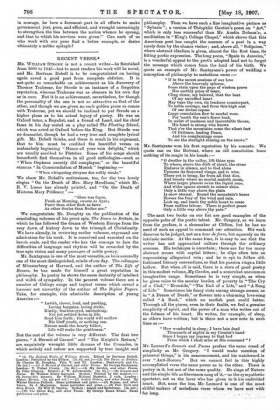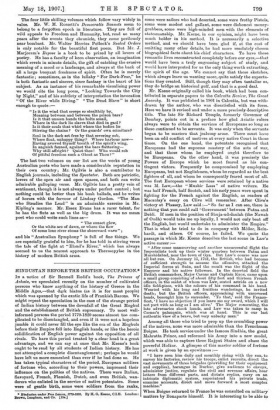RECENT VERSE.*
Mn. WILL/AM STRODE is not a recent writer—be flourished from 1600 to 1645—but to most readers his work will be novel, and Mr. Bertram Dobell is to be congratulated on having again saved a good poet from complete oblivion. It is not quite so remarkable an achievement as his discovery of Thomas Traherne, for Strode is an instance of a forgotten reputation, whereas Traherne was as obscure in his own day as in ours. But it is an achievement, nevertheless, for though the personality of the one is not so attractive as that of the other, and though we are given no such golden prose as comes with Traherne, yet we should be inclined to put Strode on a higher plane as to his actual legacy of poetry. He was an Oxford tutor, a Royalist, and a friend of Laud, and his chief fame in his day rested on a play called The Floating Island, which was acted at Oxford before the King. But Strode was no dramatist, though he had a very true and complete lyrical gift. Mr. Dobell thinks, and there is much in his argument, that to him must be credited the beautiful verses on melancholy beginning "Hence all your vain delights," which are usually ascribed to Fletcher. Some of his songs should henceforth find themselves in all good anthologies—such as "When Orpheus sweetly did complayne," or the beautiful stanzas "In Commendation of Musick beginning :— " When whispering streyms doe softly steak."
We share Mr. Dobell's enthusiasm, too, for the two lovely elegies "On the Death of Mrs. Mary Meudham," which Mr. E. V. Lucas has already printed, and "On the Death of Mistress Mary Prideaux ":—
"Shea was fayre, Fresh as Morning, sweete as Ayre ; Purer than other flesh as Jerre As other Sonles than Bodies are." '
We congratulate Mr. Doughty on the publication of the concluding volumes of his great epic, The Dawn in Britain, in which be has followed the drama of Western Europe from the very dawn of history down to the triumph of Christianity. We have already, in reviewing earlier volumes, expressed our admiration for his work. It is conceived and executed on the heroic scale, and the reader who has the courage to face the difficulties of language and rhythm will be rewarded by the true epic vision and many passages of noble poetry.
Mr. Santayana is one of the most versatile, as he is assuredly
one of the most distinguished, minds of our day. The colleague of Miinsterberg at Harvard, and the author of The Life of Reason, he has made for himself a great reputation in philosophy. In poetry he shows the same dexterity of intellect and width of sympathy. In the present volume there are a number of College songs and topical verses which reveal a humour not unworthy of the author of The Biglow Papers. Take, for example, this admirable description of young America :—
" Lavish, clever, loud, and pushing, Loving bargains, loving strife, Kindly, fearless-eyed, unblushing, Not yet settled down in life. Send him forth ; the world will mellow His bluff youth, or nothing can. Nature made the hearty fellow, Life will make the gentleman."
But the rest of the volume is very different. The first two pieces, "A Hermit of Carmel" and "The Knight's Return," are exquisitely wrought little dramas of the Crusades, in which melody and colour are supported by true insight and philosophy. Then we have such a fine imaginative picture as "Sybaris "; a version of Theophile Gautier's poem on "Art," which is only less successful than Mr. Austin Dobson's; a meditation in "King's College Chapel," which shows that this American poet has caught the essence of a past in a way rarely done by the chance visitor, and, above all, "Solipsism," where abstract idealism is given, almost for the first time, its fitting poetic expression. The long poem, "Spain in America," is a wonderful appeal to the poet's adopted land not to forget the message which comes from the land of his birth. We quote an example of Mr. Santayana's power of wedding a conception of philosophy to melodious verse " If in the secret sessions of our love
Above the heavenly spheres. Some stain upon the page of wisdom prove Her earthly price of tears, Cling closer, my beloved, that the beat Of my unruffled heart
May tune thy own, its tenderer counterpart,
To noble courage, and from this high seat Of our divine repose Large consolation flow to mortal woes.
For 'neath the sun's fierce heat, In midst of madness and inscrutable throes, His heart is strong who knows That o'er the mountains come the silent feet Of Patience, leading Peace, And his complainings cease To see the starlight shining on the snows."
Mr. Santayana won his first reputation by his sonnets. We quote one on the Brevent, where an old consolation loses nothing of its magic in his hands :— "0 dweller in the valley, lift thine eyes To where, above the drift of cloud, the stone Endures in silence, and to God alone Upturns its furrowed visage, and is wise. There yet is being, far from all that dies, And beauty where no mortal maketh moan, Where larger planets swim the liquid zone, And wider spaces stretch to calmer skies. Only a little way above the plain
Is snow eternal. Round the mountain's knees Hovers the fury of the wind and rain. Look up, and teach thy noble heart to cease From endless labour. There is perfect peace Only a little way above thy pain."
The next two books on our list are good examples of the opposite poles of the poetic talent. Mr. Gregory, as we learn from the preface, is a shoemaker at Clifton, but he has no need of such an appeal to command our attention. His. work deserves to be judged, not as a tour de force, but squarely on its intrinsic merits. At the same time, it is easy to see that the writer has not approached culture through the ordinary avenues. His technique is uncertain ; there are far too many abstract nouns with capital letters ; he slips often into an unpromising allegorical vein ; and he is apt to follow oldfashioned literary conventions, so that his passion rings a little hollow. But when all is said, there is a store of good poetry in this modest volume, My Garden, and a somewhat uncommon imaginative range. Sometimes he is very simple, as when he gives voice to the secular burden of poverty in The Cry of a Clod," "Eventide," "The End of a Life," and "A Song of Life." Sometimes his fancy riots among strange scenes; as in "A Dream of Death," or flowers into a elm:ruling love-song called "A Book," which no modish poet could better. Through all the pieces, even in their faults, we feel a genuine simplicity of spirif,,and ate power of a man who writes out of the fulness of his heart. He writes, for example, of sleep, as others have written; heit Is there not a new note in such lines as :— " How wonderful is sleep; I have lain"dead Thousands of nights in my Creator's hand Since I began my Journey tcrthat bed
From which I shall arise at His command "1
Mr. Leonard's Sonnets and Poems profess the same creed of simplicity as Mr. Gregory,. "I would make mention of primeval things," is his announcement, and his watchword is ever "Anti-Rococo." But we cannot feel in this highly accomplished verse'the same power as in the other. There is poetry in it, but not of the same quality. He sings of Nature and the simple life as Stevenson sang of it,—as the sympathetic spectator, not as the lover who has given to it his undivided heart. But, none the less, Mr. Leonard is one of the most skilful makers of melodious verse whom we have met with for long.
The four little shilling volumes which follow vary widely in value. Mr. W. M. Rossetti's Democratic Sonnets seem to belong to a forgotten epoch in literature. They are full of wild appeals to Freedom and Humanity, but, read so many years after the events they chronicle, they come perilously near bombast. Mr. Walter Herries Pollock's Sealed Orders is only notable for the beautiful first poem. But Mr. J. Marjoram's Repose is a book to be prized by all lovers of poetry. He has a faculty of keen observation, an imagination which revels in minute details, the gift of catching the evasive meaning of a mood or a landscape, and always at the back of all a large buoyant freshness of spirit. Often be is merely fantastic ; sometimes, as in the lullaby "For Dark-Fear," he I, both fantastic and sincere, since fantasy is the heart of his subject. As an instance of his remarkable visualising power we would cite the long poem, "Looking Towards the City by Night," and of his subtlety of interpretation the invocation "Of the River while Diving." "The Dead Slave" is short enough to quote ;—
"Is it the wind that creeps so stealthily by, Moaning between and between the prison bars? Is it that unseen bands the bolts assail, Where in the dark lie slaves that died in gaol ? Is it their souls that whirl where the bodies lie Stirring the chains ? Or the guards' own scimitars?
Soul in the dark set free by that severing sob. Where float, unhappy thing P Where harbour now— Raving avowed thyself breath of the spirit's wing, In anguish fanned, against the bars fluttering— Why still affright ? Quiet thee! Who would rob Of pitiful freedom such a Ghost as Thou?"
The last two volumes on our list are the works of young Australian poets who have made a considerable reputation in their own country ; Mr. Ogilvie is also a contributor to English journals, including the Spectator. Both are patriotic, lovers of the open air and open spaces, and both can write admirable galloping verse. Mr. Ogilvie has a pretty vein of sentiment, though it is not always under perfect control ; but nothing could be better than his bush ballads, and he writes of horses with the fervour of Lindsay Gordon. "The Man who Steadies the Lead" is an admirable exercise in Mr. Kipling's manner. Mr. Essex Evans has a rarer talent, for lie has the flute as well as the big drum. It was no mean poet who could write such lines as
• "l'he sunset glow, Or the white arc of dawn, or where the flow Of some lone river stems the shoreward wave" ;
and his "Australian Symphony" is full of fine things. We are especially grateful to him, for he has told in stirring verse the tale of the fight at "Eland's River," which has always seemed to us the nearest approach to Thermopylae in the history of modern British arms.







































 Previous page
Previous page